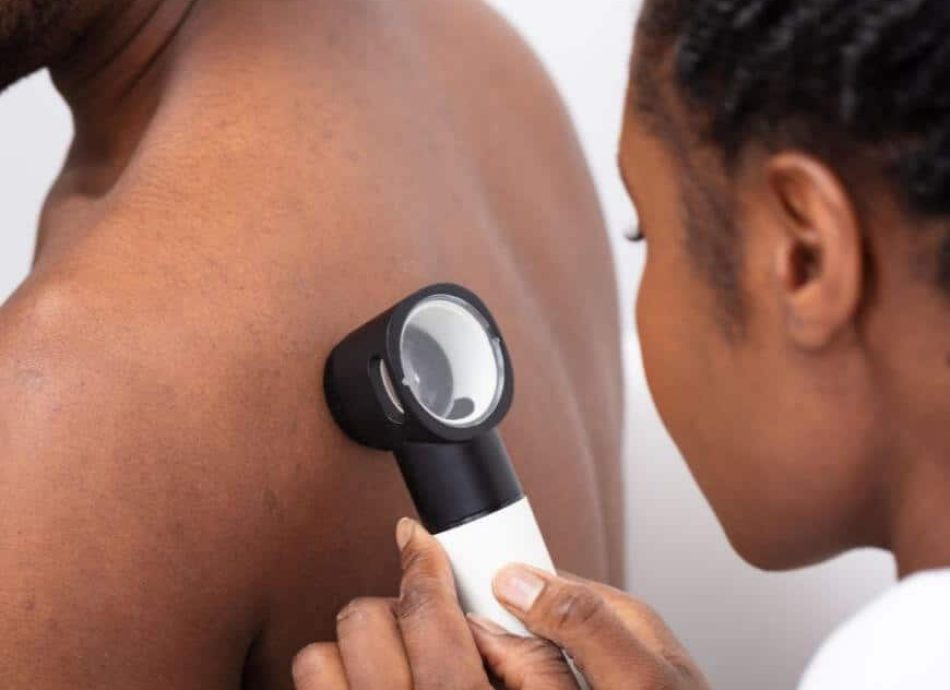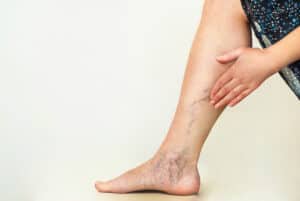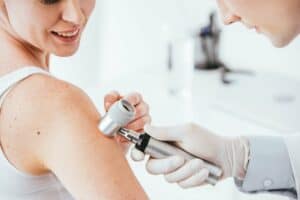Award winning dermatology service, with over 20 years on experience
Short waiting lists, on some occasions offering same week appointments
Safe environment, in Care Quality Commission approved facilities
Conditions we treat
Menopause skincare - What you need to know to care about your skin
What is Menopause?
Menopause is a process a woman goes through that marks the end of her reproductive years. During this time, the levels of the hormones estrogen and progesterone decline, leading to a range of physical and emotional changes. These changes can affect various parts of the body, including the skin, bones, heart, and brain.

What happens to the skin during menopause?
Dryness and itchiness
Dry and itchy skin: during menopause, the ovaries stop releasing eggs, periods come to an end, and the production of estrogen begins to decline. Estrogen is a powerhouse hormone. Estrogen stimulates the formation of skin-smoothing collagen oils. As menopause approaches, it is very normal for the skin gets dry and itchy.
Skin Thinning
Skin thinning: The decrease in estrogen levels can also cause a reduction in collagen production, which can lead to thinner, more fragile skin.
Lines and Wrinkles
Lines and wrinkles: Collagen and elastin decrease significantly during menopause. These are essential for the structure, support and elasticity of the skin, and a lack of these connective tissues leads to wrinkles. As the skin becomes thinner and less elastic, wrinkles and fine lines can become more visible.
Age Spots
Age spots: Menopause can also cause an increase in the production of melanin, which can result in the development of age spots and other areas of hyperpigmentation.
Acne
Acne: Some women may experience acne during menopause due to changes in hormone levels. In most cases, prescription medication can clear up menopausal acne. Some women may find success using natural treatment methods.
Sun Damage
Sun damage: As estrogen levels decline, the skin may become more sensitive to the sun’s harmful ultraviolet (UV) rays. This can lead to sunburn, hyperpigmentation, and an increased risk of skin cancer. In addition, some women may be more likely to spend time outdoors during menopause due to changes in their lifestyle or activities, which can increase their exposure to the sun.
Hair Loss & Alopecia
Estrogen helps to promote hair growth and prolong the hair growth cycle, so when levels of this hormone decline, hair may become thinner and more prone to falling out. In addition, menopause can also cause a decrease in the production of other hormones, such as progesterone and testosterone, which can contribute to hair loss. Stress, poor nutrition, and certain medications are also factors that contribute to hair loss during menopause.
Polycystic Ovary Syndrome
FREQUENTLY ASKED QUESTIONS
WHEN DOES MENOPAUSE START?
WHAT ARE THE SIGNS OF MENOPAUSE?
Hot flashes, night sweats, vaginal dryness, mood swings, and difficulty sleeping are some of the common symptoms of menopause.
HOW SHOULD I TAKE CARE OF MY SKIN DURING MENOPAUSE?
During this phase, it is important to take care of your skin to maintain its health and appearance. While it’s always a good idea to see a dermatologist for personalised advice, here are some general tips: use a gentle cleanser, moisturise regularly, wear sunscreen, and use products with retinoids. Avoid using aggressive exfoliants and having hot showers and baths.
WHY SHOULD I CONSULT A DERMATOLOGIST WHEN ENTERING MENOPAUSE?
There are several reasons why a woman should consider seeing a dermatologist during menopause. Menopause can cause a range of skin changes, including dryness, thinning, wrinkles, age spots, acne, sun damage and hair loss. A dermatologist can help diagnose these skin conditions and provide personalised treatment options to help manage them. A dermatologist can also provide guidance on how to maintain healthy skin during menopause. They can recommend skincare products that are best suited to a woman’s individual needs and advise on lifestyle changes that can help support skin health. Additionally, hormonal changes during menopause can increase the risk of certain skin conditions, such as skin cancer and melanoma. Regular skin exams with a dermatologist can help detect these conditions early when they are more easily treatable.
HOW CAN A MENOPAUSAL SKINCARE CONSULTATION AT STRATUM DERMATOLOGY CLINICS HELP ME?
Seeing a dermatologist during menopause can help women manage a range of skin conditions and maintain healthy skin as they age. Regular skin exams with a dermatologist can also help detect and treat skin cancer and other skin conditions early, when they are more easily treatable.
REQUEST A CALL BACK
Please fill in this form and one of our team will give you a call back to arrange a consultation with one of our expert dermatologists.

WHY HAVE A MENOPAUSAL SKINCARE CONSULTATION AT STRATUM DERMATOLOGY CLINICS?
At Stratum Dermatology Clinics, we work with leading experts in the field of dermatology to ensure you have the best experience and treatment. Stratum Dermatology Clinics are regulated by the Care Quality Commission, are part of the British Association of Dermatologists and are top-rated by patients on Doctify, so you can assure safe and effective acne treatment with us.
latest INSIGHTS AND ADVICE

Acne Awareness Month 2023
Acne is one of the most common skin conditions, affecting a significant percentage of the population. Despite its prevalence, few people know that June is acne awareness month. This presents a perfect opportunity to delve deeper into the condition and answer some of the burning

Varicose Veins: Causes, Symptoms and Treatment
Do you have unsightly or uncomfortable leg veins? While some leg veins are harmless, varicose veins can cause symptoms like pain, swelling, itching, and cramping. These threats can be mitigated with early detection and timely action, so don’t wait to be seen by your GP

Why should I see a Consultant Dermatologist?
BENEFITS OF SEEING A CONSULTANT DERMATOLOGIST. You may have heard of the term ‘Consultant Dermatologist’ but not really known exactly what they do or what the benefits of seeing one are. Here we will explain what dermatology is, what a Consultant Dermatologist is and how